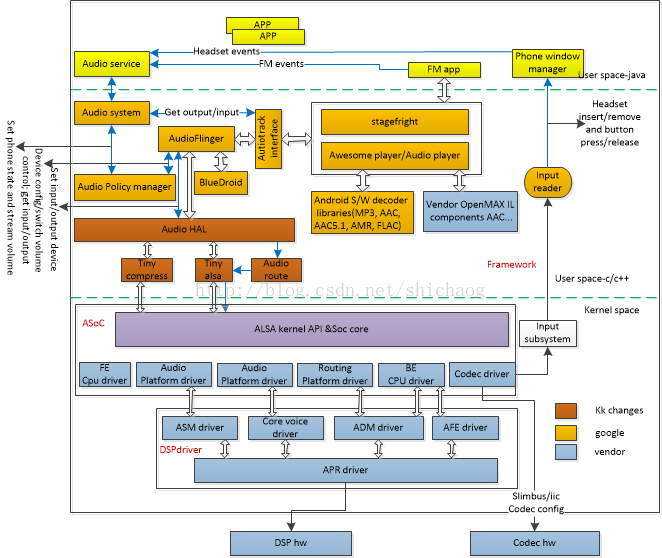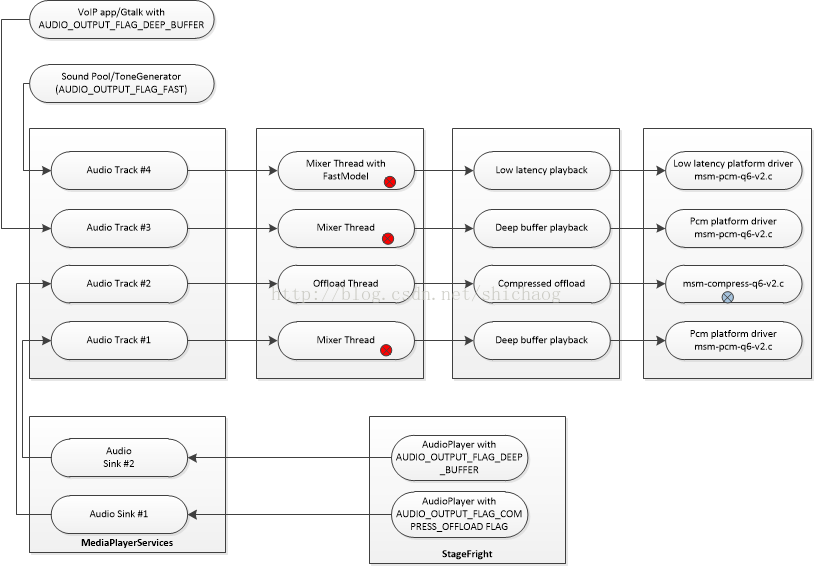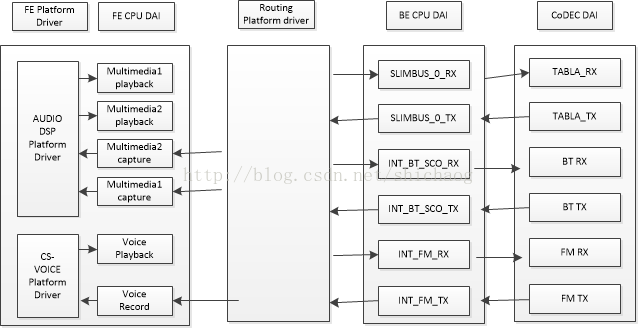第二十二章 安卓音频架构
 主要分为四个层次:
1.最底层是硬件层;
2.在这之上的是驱动层,这一层一般codec芯片会给一个基本的驱动示例;
3.在这之上是Linux的框架层,ALSA,
4.这之上是安卓audio管理层;
主要分为四个层次:
1.最底层是硬件层;
2.在这之上的是驱动层,这一层一般codec芯片会给一个基本的驱动示例;
3.在这之上是Linux的框架层,ALSA,
4.这之上是安卓audio管理层;
ALSA System on Chip(ASoC)
ASoC 驱动将一个audio子系统分成四个部分: Machine driver, Platform driver, CPU driver以及Codec driver。
Machine 驱动
- 将平台,CPU以及codec驱动绑定在一块
- 实现在kernel/sound/soc/msm/
- 定义前端FE和后端BE,DAI(digital audio interface) links
platform 驱动
- 包括了平台相关的音频数据流的传输和路由的控制
- 被区分成FE和BE两个平台驱动
FE
- Audio -例化PCM播放和采集,将播放的pcm数据从用户空间传递给DSP,采集是逆过程,高通使用ASM接口,实现于kernel/sound/soc/msm-pcm-q6.c
- Voice-初始化和销毁语音电话建立,实现与kernel/sound/soc/msm-pcm-voice-v2.c
- VoIP-初始化和销毁MVS接口在DSP和用户空间互传数据。kernel/sound/soc/msm-pcm-voip-v2.c
- Compress offload-Compress offload 播放数据传输到DSP。kernel/sound/soc/msm-compress-q6-v2.c
BE
- Routing-audio 通路选择,kernel/sound/soc/msm-pcm-routing-v2.c
CPU driver
分为FE和BE CPU驱动
FE
- 提供了ALSA SoC framework需要的FE PCM设备信息,由平台驱动提供的ASoC framework和音频路由表可以指示PCM 播放/采集。
- FE CPU DAI实现于kernel/sound/soc/msm/msm-dai-fe.c
BE
- 根据初始化的PCM播放和采集配置DSP AFE模块对应的audio 音频端口
- 定义了BE CPU DAI实现于kernel/sound/soc/msm/qdsp6v2/msm-dai-q6-v2.c
Framework层
- Audio Hardware Abstraction Layer(AHAL)-使用tinyalsa将AudioFlinger调用映射到ASOC驱动
- tinyalsa-kernel ASoC驱动接口,AHAL使用,提供了stream和设备管理需要的基本PCM和Mixer控制API
- Audio Route-该模块从XML文件读取ALSA mixer控制器,并根据AHAL设置mixer控制器。
- Multimedia framework -stageFright1)使用标准音频格式的播放和采集;2)和编解码库以及OpenMAX IL组件通信,实现音频编解码
- Audio service 1)运行时服务,由system server启动,service manager管理;2)注册intents,当接收到来自不同应用(HDMI,Bluetooth)的信息后通知Audio系统
- Audio Flinger 1)通过libaudio, 蓝牙A2DP管理所有音频输入/输出设备, 2)将多个audio stream合成单一PCM,混合的output输出源被路由给输出设备 3)music stream播放的音量控制
- Audio Policy Manager(APM) 1)定义了多个音频源并发的管理策略 2)设置场景(电话,音乐,系统音,通知) 3)定义了音频类型(语音,播放,ring)在何种设备上播放(Bluetooth, speaker, headset)
- APM的职责如下 1)管理各种输入/输出设备接口 2)管理各种输入/输出设备, mic/speaker/headphone/headset/A2DP以及Bluetooth SCO 3)基于stream模式选择和定义合适的路由策略 4)管理每一个stream的音量
Audio Output Stream and Volume Control

- 缺省的音频输出(primary output)使用AudioFlinger中的Mixer线程,音量和音效将在Flinger中使用
- Lowlatency输出使用AudioFlinger中的快速mixer,音量控制在Flinger中
- Compress offload播放使用Audio Flinger中的compress offload线程,音量和音效在DSP中。
- VoIP播放在AudioFlinger中的mixerThread,Volume和echo cancelation由DSP完成。
设备和流管理

Frontend DAI
- 对用户空间作为PCM设备可见
- 可以将Audio路由到多个BE DAI
- Routing由用户空间mixer控制
- PCM由ALSA直接控制
- 定义与msm-dai-fe.c
static struct snd_soc_dai_driver msm_fe_dais[]={
.playback = {
.stream_name = "Multimedia1 Playback",
.aif_name = "MM_DL1",
.rates
...
}
}
当front DAI使能时,AIF将会被使能。
代码分布
用户空间和audio相关的代码
/hardware/qcom/audio/hal/msm8974 – Contains the audio Hardware Abstraction Layer (HAL)-related code
/external/tinyalsa/ – Contains the code related to tinymix, tinyplay, and tinycap
/hardware/qcom/audio/mm-audio – Contains the implementation of QTI OMX components for the audio encoder and decoders
/frameworks/av/media/libstagefright/ – Contains the source code for Google’s Stagefright implementation
/frameworks/av/media/libmediaplayerservice/nuplayer - Contains the source code for Google’s nuplayer implementation
/frameworks/av/services/audioflinger/ – Contains the source code for AudioFlinger that manages audio streams from the user space
/vendor/qcom/proprietary/mm-audio/ – Contains the code related to the Audio Calibration Database (ACDB) driver, parsers for DTS and AC3, surround sound, SVA, etc
/external/bluetooth/bluedroid/ – Contains the code related to Bluetooth® (BT) A2DP used in a QTI platform
/external/bluetooth/bluedroid/audio_a2dp_hw/ – Contains the A2DP audio HAL implementation
/hardware/libhardware/modules/usbaudio/ – Contains the USB HAL implementation for a USB dock use case
/hardware/qcom/audio/hal/audio_extn/:
audio_extn.c – Implements the wrapper function for audio extension features, such as FM, Dolby, Compress capture, HFP, SVA (listen), speaker protection, SSR, USB audio over headset
usb.c – Contains the HAL implementation for USB playback and record over the headset
compress_capture.c – Contains the HAL implementation for Compress capture
dolby.c – Contains the HAL implementation for the Dolby postprocessing feature
fm.c – Contains the HAL implementation for the FM playback and recording feature
hfp.c – Contains the HAL implementation for the hands-free profile feature where the MSM™ chipset can be used as as a BT headset device
listen.c – Contains the HAL implementation for the Snapdragon™ Voice Activation (SVA) feature
spkr_protection.c – Contains the HAL implementation for the speaker protection feature
ssr.c – Contains the HAL implementation for the surround sound recording feature
/vendor/qcom/proprietary/wfd/mm/source/framework/src/ – Contains the Wi-Fi Display (WFD) frameworks-related code; WFDMMSourceAudioSource.cpp configures the RT Proxy port via ALSA APIs and gets the PCM data from the audio layer
/system/core/include/system/ – Contains audio.h and audio_policy.h that contain enum definitions and inline functions used all over the code for audio in the user space
/frameworks/base/media/java/android/media/ – Contains .java files for audio that expose APIs that can be called by Android™ applications written in Java
内核空间代码
<APSS_BUILD>/kernel/sound/soc/msm/ – Contains the msm8994.c machine driver
<APSS_BUILD>/kernel/sound/soc/msm/qdsp6v2 – Contains the source code for the platform drivers, Frontend (FE), and Backend (BE) DAI driver, QDSP drivers for AFE, ADM, and ASM, voice driver, etc.
<APSS_BUILD>/kernel/sound/soc/soc-*.c – All the soc-*.c files provide information on the ALSA SOC framework
<APSS_BUILD>/kernel/drivers/slimbus/ – Contains the source for the SLIMbus driver
<APSS_BUILD>/kernel/arch/arm/mach-msm/qdsp6v2/ – Contains the drivers for DSP-based encoders and decoders, code for the ADSP loader, APR driver, Ion memory driver, and other utility files
<APSS_BUILD>//LINUX/android/kernel/arch/arm/boot/dts – Contains msm8994-*.dtsi files that contain MSM8994-specific information;board-specific information on the MSM8994;GPIO management ; audio-related customization is available in files such as msm8994.dtsi, msm8994-mtp.dtsi, and msm8994-cdp.dtsi
<APSS_BUILD>/LINUX/android//kernel/sound/soc/codecs/ – Contains the source code for the codec driver for WCD9330; codec driver-related source files are wcd9330.c, wcd9xxx-mbhc.c, wcd9xxx-resmgr.c, wcd9xxx-common.c, etc.
<APSS_BUILD>//LINUX/android/kernel/drivers/mfd/ – Contains the source code for the codec driver; wcd9xxx-core.c, wcd9xxx-slimslave.c, and wcd9xxx-irq.c are the codec driver-related files
AudioFlinger
创建
./frameworks/av/media/mediaserver/main_mediaserver.cpp:
47 int main(int argc __unused, char** argv)
48 {
...
135: AudioFlinger::instantiate();
139 AudioPolicyService::instantiate();
140 SoundTriggerHwService::instantiate();
147 ProcessState::self()->startThreadPool();
148 IPCThreadState::self()->joinThreadPool();
}
该文件所在目录的Android.mk文件将其编译成一个可执行程序mediaserver,该程序在/system/bin/mediaserver。
59 LOCAL_MODULE:= mediaserver
60 LOCAL_32_BIT_ONLY := true
61
62 include $(BUILD_EXECUTABLE)
同时在init.rc文件有如下内容:
724 service media /system/bin/mediaserver
725 class main
726 user media
727 group audio camera inet net_bt net_bt_admin net_bw_acct drmrpc mediadrm qcom_diag
728 ioprio rt 4
也就是将mediaserver执行,即执行其中的main函数。
AudioFlinger的静态初始化
```
class AudioFlinger :
public BinderService<AudioFlinger>,
public BnAudioFlinger
/frameworks/native/include/binder/BinderService.h
33template<typename SERVICE>
34class BinderService
35{
36public:
37 static status_t publish(bool allowIsolated = false) {
38 sp<IServiceManager> sm(defaultServiceManager());
39 return sm->addService(
40 String16(SERVICE::getServiceName()),
41 new SERVICE(), allowIsolated);
42 }
43
44 static void publishAndJoinThreadPool(bool allowIsolated = false) {
45 publish(allowIsolated);
46 joinThreadPool();
47 }
48
49 static void instantiate() { publish(); }//调用的是这里的instantiate
50
51 static status_t shutdown() { return NO_ERROR; }
52
instantiate时,首先将AudioFlinger作为一个服务添加到ServiceManager中,此间会调用AudioFl的构造函数。
AudioFlinger::AudioFlinger()
: BnAudioFlinger(),
mPrimaryHardwareDev(NULL),
mAudioHwDevs(NULL),
mHardwareStatus(AUDIO_HW_IDLE),
mMasterVolume(1.0f),
mMasterMute(false),
mNextUniqueId(1),
mMode(AUDIO_MODE_INVALID),
mBtNrecIsOff(false),
mIsLowRamDevice(true),
mIsDeviceTypeKnown(false),
mGlobalEffectEnableTime(0),
mSystemReady(false)
{}
这个构造函数基本上就是对以上变量的初始化。其实际的工作放在了onFirstRef方法中完成了。 BnAudioFlinger类由虚基类RefBase层继承而来,并且IserviceManager::addService的第二个参数是个强指针引用,所以在AudioFlinger被引用时,onFirstRef将被调用。
void AudioFlinger::onFirstRef()
{
int rc = 0;
Mutex::Autolock _l(mLock);
/* TODO: move all this work into an Init() function */
char val_str[PROPERTY_VALUE_MAX] = { 0 };
if (property_get("ro.audio.flinger_standbytime_ms", val_str, NULL) >= 0) {
uint32_t int_val;
if (1 == sscanf(val_str, "%u", &int_val)) {
mStandbyTimeInNsecs = milliseconds(int_val);
ALOGI("Using %u mSec as standby time.", int_val);
} else {
mStandbyTimeInNsecs = kDefaultStandbyTimeInNsecs;
ALOGI("Using default %u mSec as standby time.",
(uint32_t)(mStandbyTimeInNsecs / 1000000));
}
}
mPatchPanel = new PatchPanel(this);
mMode = AUDIO_MODE_NORMAL;
}
ro.audio.flinger_standbytime_ms属性给用户调节stand_by时间,接下来其它进程可以通过servicemanager来访问,并通过createtrack以及openOutput等接口来驱使Audioflinger为其服务。
AudioFlinger和HAL的交互
<AudioFlinger.cpp>
static const char * const audio_interfaces[] = {
AUDIO_HARDWARE_MODULE_ID_PRIMARY,
AUDIO_HARDWARE_MODULE_ID_A2DP,
AUDIO_HARDWARE_MODULE_ID_USB,
};
#define ARRAY_SIZE(x) (sizeof((x))/sizeof(((x)[0])))
在编译的时候,这三种设备分别被编译成audio.primary.xxx.so,audio.a2dp.xxx.so的形式,xxx表示具体的硬件平台,AP会调用AF的函数AudioFlinger::loadHwModule完成对应SO的加载。
audio_module_handle_t AudioFlinger::loadHwModule(const char *name)
{
if (name == NULL) {
return 0;
}
if (!settingsAllowed()) {
return 0;
}
Mutex::Autolock _l(mLock);
return loadHwModule_l(name);//调用loadHwModule_l完成功能
}
loadHwModule_l的实现如下:
audio_module_handle_t AudioFlinger::loadHwModule_l(const char *name)
{
audio_hw_device_t *dev;
//加载对应的so库文件,通过dlsym的形式打开so文件,加载路径/system/lib/hw或者/vendor/lib/hw
//最终会调用audio_hw_hal.cpp里面的legacy_adev_open来挂载一些钩子函数, int rc = load_audio_interface(name, &dev); mHardwareStatus = AUDIO_HW_INIT; rc = dev->init_check(dev); mHardwareStatus = AUDIO_HW_IDLE;
audio_module_handle_t handle = nextUniqueId();
mAudioHwDevs.add(handle, new AudioHwDevice(handle, name, dev, flags)); //将设备添加到AF的键值对里
}
在打开so对应的音频库之后,最终调用HAL层的open函数。
static inline int audio_hw_device_open(const struct hw_module_t* module,
struct audio_hw_device** device)
{
return module->methods->open(module, AUDIO_HARDWARE_INTERFACE,
(struct hw_device_t**)device);
}
open函数里会将若干需要的钩子函数添加到audio_hw_device_t表示的结构体里。
AudioFlinger在播放流程中的行为
status_t AudioFlinger::openOutput(audio_module_handle_t module,
audio_io_handle_t *output,
audio_config_t *config,
audio_devices_t *devices,
const String8& address,
uint32_t *latencyMs,
audio_output_flags_t flags)
{
//判断要打开的设备参数是否合法
if (*devices == AUDIO_DEVICE_NONE) {
return BAD_VALUE;
}
Mutex::Autolock _l(mLock);
//创建playback线程
sp<PlaybackThread> thread = openOutput_l(module, output, config, *devices, address, flags);
if (thread != 0) {
*latencyMs = thread->latency();
// notify client processes of the new output creation
thread->ioConfigChanged(AUDIO_OUTPUT_OPENED);
// the first primary output opened designates the primary hw device
if ((mPrimaryHardwareDev == NULL) && (flags & AUDIO_OUTPUT_FLAG_PRIMARY)) {
ALOGI("Using module %d has the primary audio interface", module);
mPrimaryHardwareDev = thread->getOutput()->audioHwDev;
AutoMutex lock(mHardwareLock);
mHardwareStatus = AUDIO_HW_SET_MODE;
mPrimaryHardwareDev->hwDevice()->set_mode(mPrimaryHardwareDev->hwDevice(), mMode);
mHardwareStatus = AUDIO_HW_IDLE;
}
return NO_ERROR;
}
return NO_INIT;
}
sp<AudioFlinger::PlaybackThread> AudioFlinger::openOutput_l(audio_module_handle_t module,
audio_io_handle_t *output,
audio_config_t *config,
audio_devices_t devices,
const String8& address,
audio_output_flags_t flags)
{
//根据key-value找到相应的audio interface
AudioHwDevice *outHwDev = findSuitableHwDev_l(module, devices);
if (outHwDev == NULL) {
return 0;
}
audio_hw_device_t *hwDevHal = outHwDev->hwDevice();
if (*output == AUDIO_IO_HANDLE_NONE) {
*output = nextUniqueId();
}
mHardwareStatus = AUDIO_HW_OUTPUT_OPEN;
// FOR TESTING ONLY:
// This if statement allows overriding the audio policy settings
// and forcing a specific format or channel mask to the HAL/Sink device for testing.
if (!(flags & (AUDIO_OUTPUT_FLAG_COMPRESS_OFFLOAD | AUDIO_OUTPUT_FLAG_DIRECT))) {
// Check only for Normal Mixing mode
if (kEnableExtendedPrecision) {
// Specify format (uncomment one below to choose)
//config->format = AUDIO_FORMAT_PCM_FLOAT;
//config->format = AUDIO_FORMAT_PCM_24_BIT_PACKED;
//config->format = AUDIO_FORMAT_PCM_32_BIT;
//config->format = AUDIO_FORMAT_PCM_8_24_BIT;
// ALOGV("openOutput_l() upgrading format to %#08x", config->format);
}
if (kEnableExtendedChannels) {
// Specify channel mask (uncomment one below to choose)
//config->channel_mask = audio_channel_out_mask_from_count(4); // for USB 4ch
//config->channel_mask = audio_channel_mask_from_representation_and_bits(
// AUDIO_CHANNEL_REPRESENTATION_INDEX, (1 << 4) - 1); // another 4ch example
}
}
AudioStreamOut *outputStream = NULL;
status_t status = outHwDev->openOutputStream(
&outputStream,
*output,
devices,
flags,
config,
address.string());
mHardwareStatus = AUDIO_HW_IDLE;
if (status == NO_ERROR) {
PlaybackThread *thread;
if (flags & AUDIO_OUTPUT_FLAG_COMPRESS_OFFLOAD) {
thread = new OffloadThread(this, outputStream, *output, devices, mSystemReady);
ALOGV("openOutput_l() created offload output: ID %d thread %p", *output, thread);
} else if ((flags & AUDIO_OUTPUT_FLAG_DIRECT)
|| !isValidPcmSinkFormat(config->format)
|| !isValidPcmSinkChannelMask(config->channel_mask)) {
thread = new DirectOutputThread(this, outputStream, *output, devices, mSystemReady);
ALOGV("openOutput_l() created direct output: ID %d thread %p ", *output, thread);
//Check if this is DirectPCM, if so
if (flags & AUDIO_OUTPUT_FLAG_DIRECT_PCM) {
thread->mIsDirectPcm = true;
}
} else {
thread = new MixerThread(this, outputStream, *output, devices, mSystemReady);
ALOGV("openOutput_l() created mixer output: ID %d thread %p", *output, thread);
}
mPlaybackThreads.add(*output, thread);
return thread;
}
return 0;
}